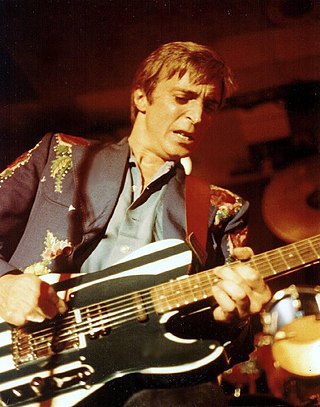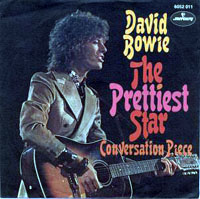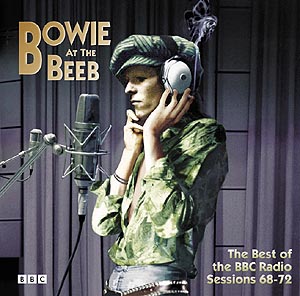Related Research Articles

Michael Ronson was an English musician, songwriter, arranger, and producer. He achieved critical and commercial success working with David Bowie as the guitarist of the Spiders from Mars. He was a session musician who recorded five studio albums with Bowie followed by four with Ian Hunter, and also worked as a sideman in touring bands with Van Morrison and Bob Dylan.

Anthony Edward Visconti is an American record producer, musician and singer. Since the late 1960s, he has worked with an array of performers. His first hit single was T. Rex's "Ride a White Swan" in 1970, the first of many hits in collaboration with Marc Bolan. Visconti's lengthiest involvement was with David Bowie: intermittently from the production and arrangement of Bowie's 1968 single "In the Heat of the Morning" / "London Bye Ta-Ta" to his final album Blackstar in 2016, Visconti produced and occasionally performed on many of Bowie's albums. Visconti's work on Blackstar was cited in its Grammy Award for Best Engineered Album, Non-Classical and his production of Angelique Kidjo's Djin Djin was cited in its Grammy Award for Best Contemporary World Music Album.

The Man Who Sold the World is the third studio album by the English musician David Bowie, originally released through Mercury Records in the United States on 4 November 1970 and in the United Kingdom on 10 April 1971. Produced by Tony Visconti and recorded in London from April to May 1970, the album features the first appearances on a Bowie record of guitarist Mick Ronson and drummer Mick Woodmansey, who later became famous as members of the Spiders from Mars.
"The Man Who Sold the World" is a song by English singer-songwriter David Bowie. The title track of Bowie's third studio album, it was released in November 1970 in the US and in April 1971 in the UK by Mercury Records. Produced by Tony Visconti, it was recorded at Trident and Advision Studios in London in May 1970, towards the end of the album's sessions; Bowie recorded his vocal on the final day of mixing for the album, reflecting his generally dismissive attitude during the sessions. Musically, it is based around a "circular" guitar riff from Mick Ronson. Its lyrics are cryptic and evocative, being inspired by numerous poems including the 1899 "Antigonish" by William Hughes Mearns. Bowie's vocals are heavily "phased" throughout and have been described as "haunting".
The Spiders from Mars were rock singer David Bowie's backing band in the early 1970s, and initially consisted of Mick Ronson on guitars, Trevor Bolder on bass guitar, and Mick Woodmansey on drums.

"The Prettiest Star" is a song by English musician David Bowie, originally released on 6 March 1970 through Mercury Records as the follow-up single to "Space Oddity". A love song for his soon-to-be wife Angie, it was recorded in January 1970 at Trident Studios in London and featured Marc Bolan on guitar, who was brought on by producer Tony Visconti. Despite praise from music journalists, the single flopped and failed to chart. Years later, Bowie rerecorded the track for his 1973 album Aladdin Sane. A more glam rock influenced take with lyrics matching themes on the album, Mick Ronson recreated Bolan's guitar part almost note-for-note. The remake was more well-received.
Michael "Woody" Woodmansey is an English rock drummer best known for his work in the early 1970s as a member of David Bowie's core backing ensemble that became known as the Spiders from Mars in conjunction with the release of Bowie's 1972 LP The Rise and Fall of Ziggy Stardust and the Spiders from Mars. With the death of Bowie in January 2016, Woodmansey became the last surviving member of the Spiders.
"The Width of a Circle" is a song written by English musician David Bowie in 1969 for the album The Man Who Sold the World, recorded in spring 1970 and released later that year in the United States and in April 1971 in the UK. The opening track on the album, it is a hard rock song with heavy metal overtones. Bowie had performed a shorter version of the song in concerts for several months before recording it.
"Black Country Rock" is a song by English musician David Bowie, released on his 1970 album The Man Who Sold the World. The song was recorded in May 1970, with sessions taking place at Trident and Advision Studios in London. The lineup featured Bowie on lead vocals, guitarist Mick Ronson, bassist/producer Tony Visconti, drummer Mick Woodmansey and Ralph Mace on Moog synthesiser. The track was mostly composed by Ronson and Visconti, who developed it using a basic song sketch from Bowie. Labelled under the working title "Black Country Rock", Bowie used the title to write the lyrics towards the end of the sessions, resulting in a repeated two-line verse and chorus. A blues rock and hard rock number, Bowie imitates T. Rex's Marc Bolan in his vocal performance.
"She Shook Me Cold" is a song written by David Bowie in 1970 for the album The Man Who Sold the World. Mick Ronson's solo guitar is influenced by hard rock as played by Cream, Led Zeppelin and Jeff Beck. Although solely credited to Bowie, this and other songs from the album were constructed around jams by all of the musicians. Tony Visconti, who played bass on the track in addition to producing the entire album, was quoted as saying, "The songs were written by all four of us. We'd jam in a basement, and Bowie would just say whether he liked them or not."

"Queen Bitch" is a song by the English singer-songwriter David Bowie. It was originally released on his 1971 album Hunky Dory before appearing as the B-side of the single "Rebel Rebel" in the United Kingdom in early 1974. It was debuted on BBC radio in June 1971 before being properly recorded at Trident Studios in London between late June and mid-July. Co-produced by Bowie and Ken Scott, the lineup consisted of the musicians who would later become known as the Spiders from Mars: guitarist Mick Ronson, bassist Trevor Bolder and drummer Mick Woodmansey.

"Ziggy Stardust" is a song written by English singer-songwriter David Bowie for his 1972 concept album The Rise and Fall of Ziggy Stardust and the Spiders from Mars. Co-produced by Bowie and Ken Scott, he recorded it at Trident Studios in London in November 1971 with his backing band the Spiders from Mars—comprising Mick Ronson, Trevor Bolder and Mick Woodmansey. Lyrically, the song is about Ziggy Stardust, a bisexual alien rock star who acts as a messenger for extraterrestrial beings. The character was influenced by English singer Vince Taylor, as well as the Legendary Stardust Cowboy and Kansai Yamamoto. Although Ziggy is introduced earlier on the album, this song is its centrepiece, presenting the rise and fall of the star in a very human-like manner. Musically, it is a glam rock song, like its parent album, and is based around a Ronson guitar riff.

"Velvet Goldmine" is a song by English singer-songwriter David Bowie. A glam rock number with lyrical references to oral sex, it was originally recorded on 11 November 1971 at Trident Studios in London during the sessions for his 1972 album The Rise and Fall of Ziggy Stardust and the Spiders from Mars. It was ultimately left off the album and subsequently released as a B-side of the UK re-release of "Space Oddity" in 1975. Praised by biographers as an undervalued classic, it later appeared on compilation albums, including on Re:Call 1, part of the Five Years (1969–1973) boxed set, in 2015. Its namesake was used for Todd Haynes's 1998 film of the same name.
"Watch That Man" is a song written by David Bowie, the opening track on the album Aladdin Sane from 1973. Its style is often compared to the Rolling Stones' Exile on Main Street. The mix, in which Bowie's lead vocal is buried within the instrumental sections, has generated discussion among critics and fans.

Slaughter on 10th Avenue is the debut album by English guitarist Mick Ronson, then-guitarist of David Bowie's backing band the Spiders from Mars. It was released in February 1974 by RCA Records.

Bowie at the Beeb is a compilation album by English singer-songwriter David Bowie, first released in 2000. Originally, it came in a three-CD set, the third, bonus CD being a live recording made on 27 June 2000 at the Portland BBC Radio Theatre. Later editions contain only the first two CDs. The bonus disc was also released as a separate single CD entitled BBC Radio Theatre, London, June 27, 2000.

The Ziggy Stardust Tour was a 1972–73 concert tour by David Bowie, to promote the studio albums Hunky Dory, The Rise and Fall of Ziggy Stardust and the Spiders from Mars and Aladdin Sane. Bowie was accompanied by his backing group, the Spiders from Mars, and integrated choreography, costumes and make-up into the live shows to make them a wider entertainment package. The tour generated significant press coverage, drawing positive reviews and launching Bowie to stardom.
Fat Mattress were an English folk rock band that formed in Folkestone in 1968. Founded by guitarist and vocalist Noel Redding, during his time as bassist for The Jimi Hendrix Experience, and vocalist Neil Landon, the band was completed by multi-instrumentalist Jim Leverton and drummer Eric Dillon. The band released two albums – Fat Mattress and Fat Mattress II – before splitting up in 1970.
Junior's Eyes was a British group led by guitarist Mick Wayne, which recorded one album and is notable for acting as David Bowie's backing band during 1969.
References
- ↑ Pitt, Kenneth (1983). David Bowie: The Pitt Report. Design Music Ltd. p. 45. ISBN 978-0-95088-160-7.
- ↑ Paytress, Mark (2002). Chris Charlesworth (ed.). Bolan: The Rise and Fall of a 20th Century Superstar. Omnibus Press. p. 155. ISBN 978-0-7119-9293-1.
- ↑ Auslander, Philip (2006). Performing glam rock: gender and theatricality in popular music. University of Michigan Press. p. 40. ISBN 978-0-472-06868-5.
- ↑ Brown, Len (2009). "Icons Influences And A Walk On The wild side". Meetings with Morrissey. Omnibus Press. ISBN 978-1-84772-987-3.
- ↑ McIver, Joel (2011). Sabbath Bloody Sabbath. Omnibus Press. p. 47. ISBN 978-1-84938-970-9.
- ↑ Sandford, Christopher (2005). Bowie: loving the alien . Da Capo Press. pp. 63. ISBN 978-0-306-80854-8.